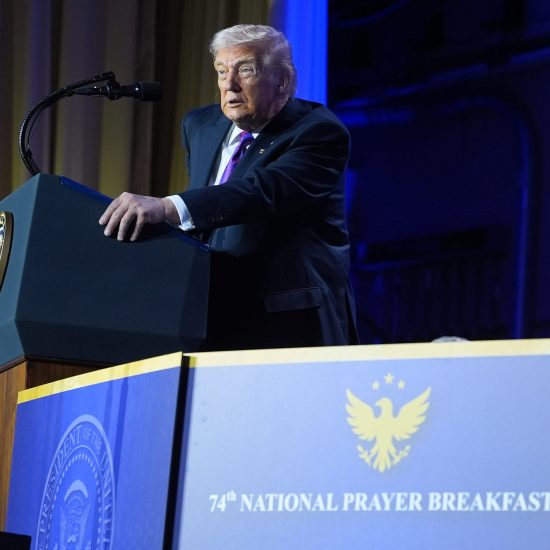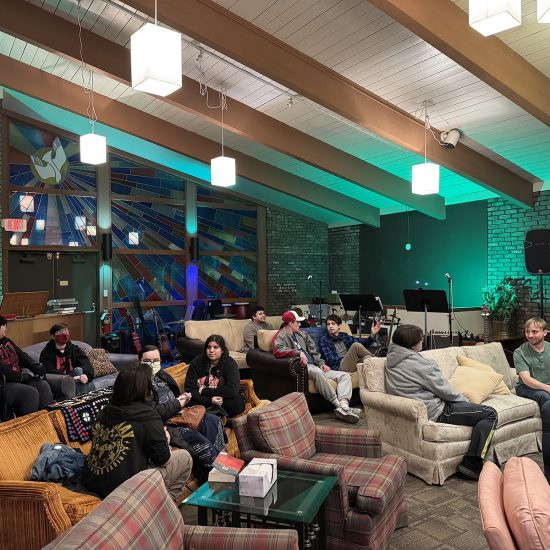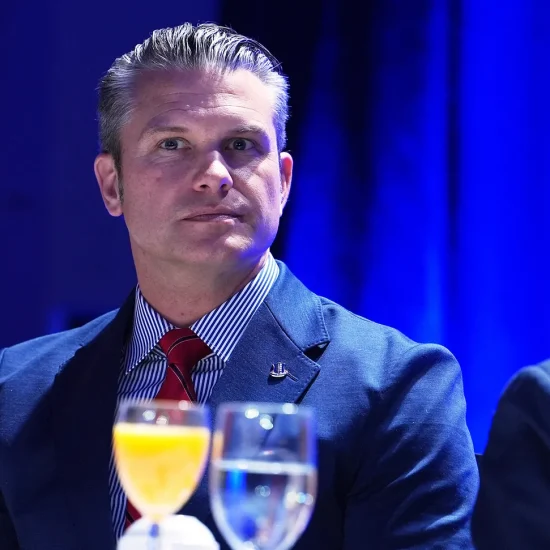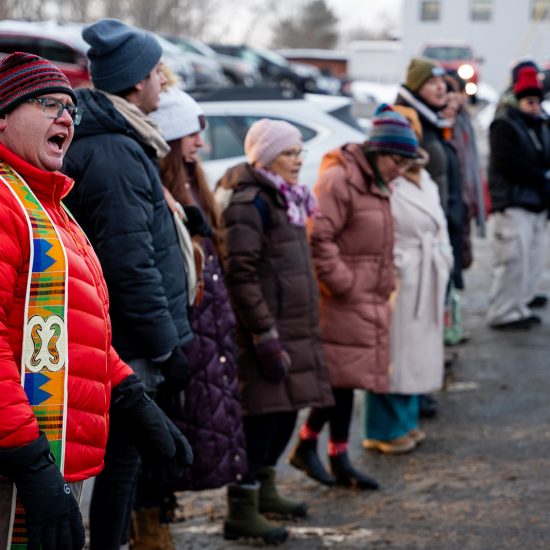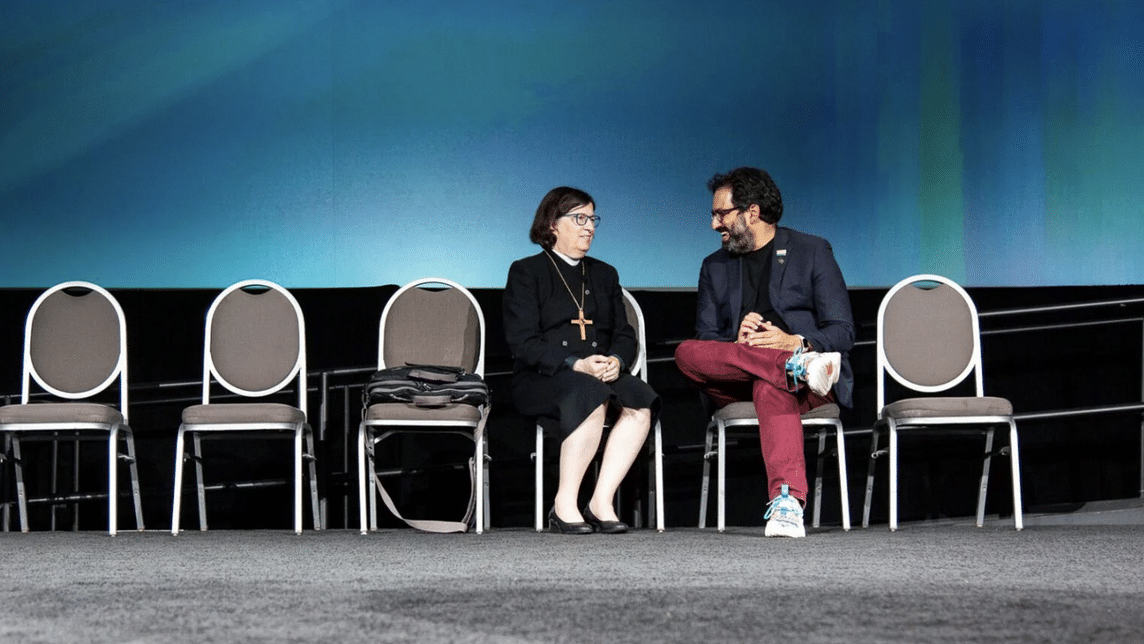
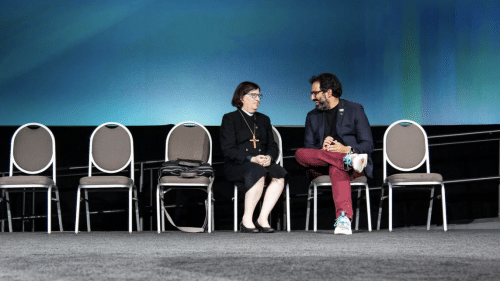
Presiding Bishop Elizabeth Eaton, left, and Imran Siddiqui converse during the ELCA Churchwide Assembly after Siddiqui’s election as vice president of the ELCA on Thursday, Aug. 11, 2022, in Columbus, Ohio. Photo by Will Nunnally/ELCA
(RNS) — When Imran Siddiqui’s name was put forward for vice president of the largest Lutheran denomination in the United States, he figured, why not fill out the paperwork? He didn’t expect to make it far in the process.
After all, every one of the more than 800 voting members of the Evangelical Lutheran Church in America’s Churchwide Assembly could nominate up to three candidates for vice president, he said.
And nobody knew who Siddiqui, a senior investigator for the U.S. Department of Labor and current vice president of the Southeastern Synod of the ELCA, was. Certainly, he didn’t have the name recognition of travel guru Rick Steves, who received a vote on the first ballot.
When just 13 people ended up nominated ahead of the denominational meeting, Siddiqui thought he might make it as far as the top seven and have an “outside chance” at the top three. That meant he would get to address the ELCA’s triennial gathering and share his experience and how important he felt it was for Lutherans to listen to one another.
That felt worth running, he said.
No one was more surprised when he came in second on the first ballot, then was elected vice president on the fifth.
“Holy crap, y’all!” Siddiqui said, taking the microphone after the final tally was announced last week (Aug. 11) during the Churchwide Assembly at the Greater Columbus Convention Center in Columbus, Ohio.
“This is surreal.”
Siddiqui’s election makes him the first Asian American elected to the highest office a layperson can hold in the ELCA. He finished ahead of Roberto Lara Aranda, president of Asociación Luterana de Ministerios Latinos ELCA, and Tracey Beasley, a member of Reformation Lutheran Church in Philadelphia.
Bishop Elizabeth Eaton, presiding bishop of the ELCA, called the results of the historic election “wonderful.”
“As our church looks ahead to the work set before us by the 2022 Churchwide Assembly, I am grateful for the experience Mr. Siddiqui brings to this position and his commitment to the important work of dismantling racism,” Eaton said in a written statement to Religion News Service.
“And as someone who is fairly new to the Lutheran church, I think Mr. Siddiqui brings a valuable perspective as we look for ways to engage new, young and diverse people.”
Siddiqui, 42, lives in Atlanta and attends St. John’s Lutheran Church, but he grew up in New Jersey and was raised Muslim — like a “Christmas and Easter Muslim,” he joked to the Lutherans gathered at Churchwide Assembly. His family only attended mosque on Islam’s two big holidays, Eid al-Fitr and Eid al-Adha, he said. They prayed together once a day, rather than the five times required by Islam.
By the time he graduated college, he considered himself an atheist.
He certainly didn’t want any part of Christianity, which he said he had only seen portrayed as judgmental and authoritative.
But then he met a group of Pentecostal Christians who were so nice, so genuinely interested in other people, they changed his mind.
After what “can only be described as a religious experience,” he said, the pieces clicked into place when some friends invited him to St. John’s. He loved the liturgy and Lutherans’ emphasis on grace, he said.
Siddiqui joined the church in 2011 and was quickly recruited to serve on its evangelism committee. Within several years, he was a member of the Southeastern Synod Council, then its vice president. The synod spans Georgia, Tennessee, Alabama and Mississippi.
“It was this weird sort of situation where folks saw something that I didn’t actually see in myself. And so it’s just kind of been a weird, kind of crazy, strange journey,” he said.
Siddiqui said he doesn’t always get all the ELCA’s “in” jokes about hot dishes and Garrison Keillor.
But he hopes he’ll bring a different perspective that will be good to have at the table.
“There are not all that many South Asians that are in this denomination, and there are not a ton of folks that may have been Muslim when they were younger,” he said.
Siddiqui also shared with the assembly his enthusiasm for consensus-based decision-making and his support for a measure approved by voting members that will create a commission to explore restructuring the governance of the denomination.
When three Lutheran denominations came together to form the ELCA in 1987, they blended three different structures. They made some “weird compromises,” Siddiqui explained to RNS. They created a structure that “seems to make no sense to absolutely anybody” in which churches, synods and the churchwide office have little accountability or power over one another.
It has been 35 years since any of those previous denominations existed, he pointed out.
“We should look at the organization now and see how we can make it an efficient organization that’s accountable to each other — that hears voices that have not been heard over the last 35 years all that often,” he said.
After winning the election for vice president of the ELCA, Siddiqui told the assembly it was “fantastic” that the top three candidates were all people of color.
But, he said, “That doesn’t mean we have solved racism. We have a lot of work to do, church.”
Siddiqui’s six-year term as vice president will begin in November. He follows Carlos Peña, who stepped into the role after the unexpected death of Bill Horne in 2021.



